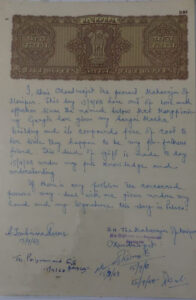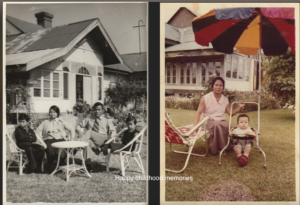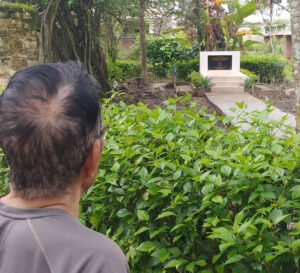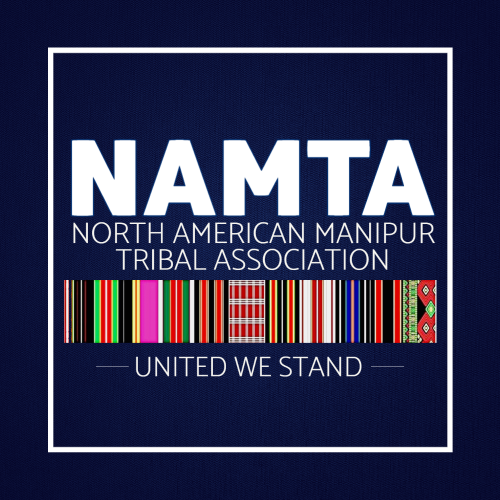NAMES
1. Mr. Paotinlal Gangte, Retired IPS Officer (Family Patriarch)
2. Mr. Lenkhothang Gangte
3. Mrs. Urmila Devi Rajkumari (Wife of Lenkhothang Gangte aka Korabin)
4. Mr. Lalpithang Gangte (Son of Korabin and Lenkhothang)
5. Miss Nieng Emsel Angelina Gangte (Daughter of Korabin and Lenkhothang)
DATES (Local Time – IST)
From: May 4th 11:00 AM
LOCATION
Home: Pisgah Bhavan Palace View, Imphal East
Camp: 1st Battalion Manipur Rifles
NARRATIVE
As told to and summarized by Lienlalthang Gangte, by Lenkhothang Gangte (Eldest Brother) and Lalpithang Gangte (Nephew).
On hearing of the news of the destruction and mob violence starting on May 3rd the family mood was very tense in anticipation of what was to come. Unsure of how widespread the upheaval was going to be they undertook whatever little preparation possible to weather the storm. Little did they know that they were about to be swept up into a whirlwind of chaos that would change their lives forever, inducing the kind of trauma and destruction that will leave a big scar on their psyches.
On May 4th, in broad daylight at around 11AM, a mob over 1000 strong assembled outside the gate of my family home and soon enough barged inside and headed towards the house. My octogenarian father and eldest brother, Len, stepped out of the house to confront the oncoming mob hoping to dissuade them from unleashing the violence they had come well prepared for. Holding on to his walker/wheelchair to help him stand, my father stood side by side with my brother as they used their bodies to block the mob from entering the house and their voices to bring some form of reason to the mad crowd.
For a moment the mob seemed a little taken aback to see them stand tall instead of cowering away. When the mob demanded to see their Aadhar identity cards as if to ascertain their tribal-ness my brother said, “My name is Len Gangte”. They seemed perplexed for a bit because there was no “Kuki” mentioned in the name; but they had set out to destroy all things Kuki from the Imphal valley. In this confrontation a stout looking man emerged from the crowd brandishing a pistol squarely aimed at my brother who simply responded to this threat by saying, “Don’t even think about it!” The man holstered the gun away and began stirring the the hostile crowd up, encouraging them to finish what they had come here to do. The pelting of stones and bricks on the house began and with it the destruction of our family home that had been in our family for over half a century.
This house, my childhood home, was given to my mother Mrs. Mangpinieng Gangte, née Sitlhou, by the Maharaja of Manipur, Shri Okendrajit in 1968. The document that is proof to this claim was hand-written and signed by the Maharaja himself wherein he refers to having gifted the “Sangai Macha” (Little Deer in Meitei language) building to her “free of cost” because as the Maharaja wrote: “they happen to be my fore-fathers friend.”

Property deed gifted by the Maharaja himself
Such endearing sentiments expressed by the King not only inspired gratitude in us for generations but also evoked a deep sense of reverence and appreciation of the acknowledgement for our ancestors friendships going back over a millennia. I have vivid memories as a little boy of him stopping by our house once in a blue moon for a casual visit. He was a sweet human, intelligent, and the most down-to-earth royal one could ever have the privilege of meeting.

The riled up crowd grew in strength and as they got more agitated somebody within the mob threw a piece of brick that hit the back of my father’s head. His blood gushed out as he fell down on the ground. As my brother tried to hold on to my father while simultaneously blocking the entrance, a few people who seemed to know my brother, calling him “Da Len”, came up and offered to take my father to the nearby hospital while someone else shouted, “Let him die. They killed our people too!”
The old man that this blood-thirsty Meitei crowd wanted to let die has been one of the most steadfast advocates of tribal communities living together in harmony with each other and the majority Meiteis. He is one of the few tribal elders I know that can not only speak the Meitei language but can also read and write it fluently. His admiration of the industriousness and ingenuity of the Meiteis was only matched by his desire for our tribal people to emulate them. This feeble looking man today was the second senior most IPS (Indian Police Service) officer in the Manipur Cadre after Shri Waikhom Damodar Singh. He played critical roles in the establishment of the Manipur Rifles, the Manipur Police Training College and left an indelible mark on the history of policing in Manipur. He served India during the Indo-Pakistani War of 1965 when he volunteered to go on deputation as a Lieutenant with the 4/3rd Gorkha Rifles and fought on the front lines in Jammu and Kashmir. It is unimaginable that a culture that prides itself as one that reveres elders could toss him off to the side to die in this manner.
After my father’s head injury the destruction was a surety. Somebody threw half a litre of petrol into the house and lit the fire that would consume our home with tongues of flame. Once the main house was set ablaze the core mob began to somewhat disperse but the looting and destruction continued. The mob stragglers completely destroyed two cars we had and set them on fire. One of them was a little car, a Chevrolet Spark, that my mother had bought years ago. She passed away in 2021 at the height of the COVID-19 delta wave in Imphal; she remains buried within the premises of our now decimated home.

Mom’s grave in the compound
The car alarms beeping, the mad mobsters screaming vulgar epithets and sounds of explosions made the whole experience seem so surreal for my brother. Many in the mob seemed intent on capturing the destructive process on their mobile devices as if to proudly document and share their misdeeds as some sort of grand achievement while inflicting pain on their fellow human beings.
After realizing that there was nothing more he could do to save the home, my brother frantically searched for my sister-in-law throughout the house even as the house was getting filled with thick black smoke. On searching a newer section of the house my brother heard a familiar voice saying, hilang nga hung ngo, lang nga (come over here, this way). It was my sister-in-law. Together they fled the scene and found their way to the 1st Battalion Manipur Rifles relief camp amidst the rioting city streets.
My brother and sister-in-law’s story is yet another fascinating saga that I’ll be remiss to not mention, even if only a smidge. Len was born and raised in Imphal. Even from my earliest memories as a little kid, I remember him as someone who surfed the city’s social fabric with such ease and familiarity that unless you personally knew him he could pass for either a Meitei or a Kuki any given day. There’s probably no leikai (neighborhood) in Imphal that he had not driven through or know the shortest cuts to get to a desired destination. His involvement in the rock music scene from his teenage years made him a well loved and known figure in this corner of the world. As recently as on the 22nd of March he led efforts to organize a tribute concert in remembrance of Manipur’s Pioneer Rockstars – starting with the late Laishram Sando.
He hung out in Meitei circles comfortably and eventually married a beautiful Meitei woman who became a matriarch of the Gangte family. We call her Heo Bin (Heo is used to address someone elder to you and Bin short for Korabin). Her heritage is also an essential part of our story. She bears the surname Rajkumari from the house of Narsingh. Even though not part of the direct line of succession to the throne, the Rajkumars and Rajkumaris of Manipur are considered part of the royal family. In times past Maharaja Leishemba Sanajaoba, the current titular king of Manipur, referred to her as Iche (Elder Sister). Such was the regard she had garnered in times of peace.
Despite decades of building deep relationships and bonds of humanity, when the crucial time came, our lot was cast in the same bucket as every other family that had a label that identified them as Kukis, a catch-all term used by people outside the Chin- Kuki-Mizo-Zomi community. The once broad minded, open and inclusive Meitei society characteristics that we had grown up to emulate and strive for seems to have been over-shadowed by the militant elements hard bent on historical revisionism. It did not matter that ours was the home of one of their Iches. It mattered not that she was the one leading the renovations and extensions of the Sangai Macha building. It meant nothing that after our mother’s passing, she was indeed the family’s matriarch. Ningol Chakouba, a festival celebrated by the Meitei people to strengthen the bond of love between married women (ningol) and their paternal families, is still months away. I wonder, after these scarring events before the monsoon rains arrive, if all the ningols would be invited back for the feast; by autumn I wonder what would be left in this city to celebrate.

Remodeling Pisgah Bhavan less than a year ago- all burned on May 4,2023
Vung Hangzo

Hold fast and keep the faith for He will make all things beautiful in His time
Sad. What the world has come to…!
I myself have friends (from the Meetei community in Imphal) since my earliest memory, and have been steadfast friends, and now this…
“Beware of the powers that be”
So-called leaders (in the valley) are the true culprits – namely the current political and civil mechanisms bigwigs. Down with them.
Let us not let hate win. Though it may seem impossible now, time can and will heal the wounds.